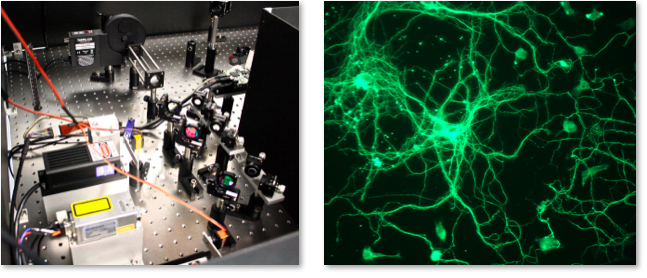
We have 2 PhD studentship openings for 2018. Applications are open now! Please get in touch.
PhD to work on new tricks that enable imaging in scattering samples
Deadline: 31st January 2018
Title: Microscopy in scattering media
Funding: EPSRC - Fees & Scholarship
Apply: Online
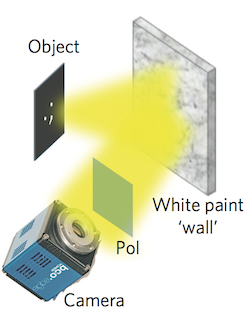 The scattering of light in imaging is often
regarded as a problem, but has more recently been recognised to allow
unexpected tricks, for example, seeing around corners, illustrated on
the left. In microscopy, when one images through a scattering medium it seems on first sight that all
detail has been lost in a "fog". This is illustrated below with an
image taken on our microscope. No clear features are recognisable in the
recorded image, everything appears to be a blur. However, there is
information about the object encoded in the image.
The scattering of light in imaging is often
regarded as a problem, but has more recently been recognised to allow
unexpected tricks, for example, seeing around corners, illustrated on
the left. In microscopy, when one images through a scattering medium it seems on first sight that all
detail has been lost in a "fog". This is illustrated below with an
image taken on our microscope. No clear features are recognisable in the
recorded image, everything appears to be a blur. However, there is
information about the object encoded in the image.
The blurred image is not completely featureless, it contains information in the form of a speckle pattern, a fine granular pattern of light and dark regions. Such speckle patterns are very familiar to those who have previously worked with coherent light sources, such as lasers. By clever image processing, the speciality of our collaborator Jacopo Bertolotti, we can recover the image of the actual object, as if no scattering had taken place. This is illustrated in the reconstruction that was calculated from the recorded image. It clearly shows a pattern in the shape of an "F", matching the actual test pattern that we had used.
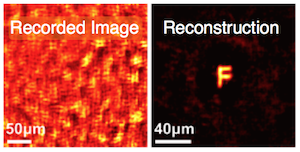 The PhD project will focus on extending this
method into a practical way to take microscopy images in samples that
are currently regarded as too scattering to allow any meaningful
imaging. Since many biological samples, such as bone or the brain, are
made of such strongly scattering materials, the new methodology has major
relevance for bio-imaging.
The PhD project will focus on extending this
method into a practical way to take microscopy images in samples that
are currently regarded as too scattering to allow any meaningful
imaging. Since many biological samples, such as bone or the brain, are
made of such strongly scattering materials, the new methodology has major
relevance for bio-imaging.
The 4-year PhD project is run through the highly regarded MetaMaterials CDT in Physics, and will be co-supervised by Jacopo Bertolotti and Christian Soeller. Please feel free to contact us, we are happy to discuss all aspects of the project.
For further details, and to apply online, please consult the advert.
PhD to work on 3D super-resolution microscopy with deformable mirrors
Deadline: 10th January 2018
Title: Microscopy With a Deformable Mirror
Funding: EPSRC - Fees & Scholarship
Apply: Online
In astronomy, adaptive optics using deformable mirrors has revolutionised ground based observation.
In microscopy, we have only recently begun to use deformable mirrors for flexible and dynamic control of the optical properties. Deformable mirrors enable us to change the optical aberrations, either to compensate for aberrations in the system, or, as we intend here, to deliberately introduce aberrations that allow us to improve the ability to localise individual molecules in 3D.
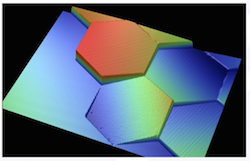 In the project we will use a
MEMS
deformable mirror (see on the right)
to dynamically control the properties of the microscope optics. This
will allow us to build 3D super-resolution images of much improved
quality, which is critical in the imaging of biological samples, such
as animal and plant cells. The resolution improvement as compared to
confocal microscopy is quite dramatic.
In the project we will use a
MEMS
deformable mirror (see on the right)
to dynamically control the properties of the microscope optics. This
will allow us to build 3D super-resolution images of much improved
quality, which is critical in the imaging of biological samples, such
as animal and plant cells. The resolution improvement as compared to
confocal microscopy is quite dramatic.
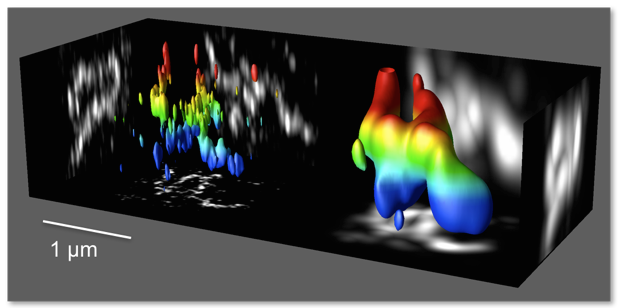 The project builds on our very successful
Phase Ramp Technology
which is now used
commercially in all Zeiss Elyra super-resolution microscopes.
The project builds on our very successful
Phase Ramp Technology
which is now used
commercially in all Zeiss Elyra super-resolution microscopes.
The project will provide training in imaging, computing and optical design. Supervision is provided by Christian Soeller, Alex Corbett and Mike Deeks. Please feel free to contact us, we are happy to discuss all aspects of the project.
For further details, and to apply online, please consult the advert.